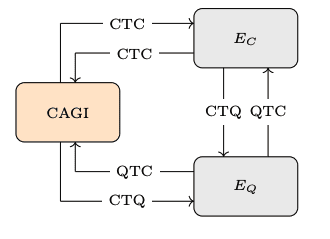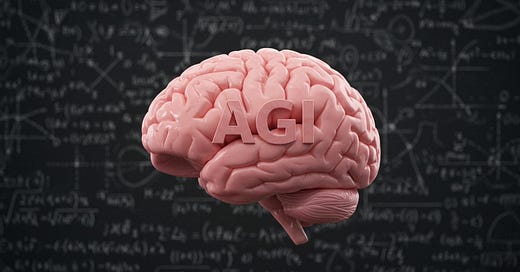The pursuit of artificial general intelligence (AGI), a hypothetical intelligence possessing human-level cognitive abilities, frequently centres on computational power and algorithmic sophistication. New work aims to uncover how Quantum AGI may differ from classical AGI. A rigorous examination of the underlying physical principles governing information processing reveals potential limitations and novel constraints. Researchers investigate how fundamental tenets of quantum mechanics, such as non-locality – the ability of particles to be instantaneously correlated regardless of distance – contextuality – where the properties of a quantum system depend on the measurement context – and the no-cloning theorem – which prohibits the creation of perfect copies of unknown quantum states – impact the feasibility and characteristics of AGI systems.
Elija Perrier, from the Centre for Quantum Software & Information at UTS Sydney, and Michael Timothy Bennett, of the Australian National University, Canberra, address these considerations in their paper, “Quantum AGI: Ontological Foundations”, where they propose an information-theoretic framework to differentiate between classical and quantum approaches to AGI and explore how the mechanics of implementation fundamentally shapes the nature of agency within such systems.
Quantum mechanics presents a compelling, albeit challenging, pathway towards realising Artificial General Intelligence (AGI), moving beyond the limitations inherent in classical computational approaches. Researchers actively investigate how foundational results in quantum mechanics, specifically Bell’s theorems, the Kochen-Specker theorem, and the no-cloning theorem, both challenge and enable advancements in AGI development, demanding a re-evaluation of established paradigms. Bell’s theorems demonstrate the limitations of local hidden variable theories, implying that quantum correlations cannot be explained by classical physics. The Kochen-Specker theorem demonstrates that assigning definite values to all observable properties of a quantum system is logically impossible, while the no-cloning theorem rigorously prohibits the creation of an identical copy of an arbitrary unknown quantum state.

These quantum phenomena afford potential advantages in areas such as problem-solving and information processing, while simultaneously imposing novel constraints on system design and functionality. The no-cloning theorem receives particular emphasis as a fundamental constraint on AGI systems, influencing learning and generalisation processes; it suggests that AGI systems may need to rely on transformation and manipulation of information rather than simple replication. The inherent contextuality revealed by the Kochen-Specker theorem suggests that information processing in a quantum AGI may differ fundamentally from the deterministic logic of classical AI, allowing for a more nuanced and flexible representation of knowledge; contextuality implies that the value of a property is dependent on the measurement context.
Quantum ontology, the study of being and existence within a quantum framework, may unlock new capabilities for AGI, while simultaneously imposing constraints on its architecture and functionality. Maintaining quantum coherence, the preservation of these delicate quantum states, which allows for superposition and entanglement, presents a significant hurdle; decoherence, the loss of coherence due to interaction with the environment, requires robust quantum error correction techniques to mitigate its effects.
Researchers actively explore techniques for leveraging quantum entanglement, a phenomenon where two or more particles become linked together regardless of the distance separating them, to enhance the computational power and efficiency of AGI systems. Quantum machine learning algorithms, which combine the principles of quantum mechanics and machine learning, offer the potential to solve complex problems intractable for classical algorithms. The development of quantum sensors and actuators, devices that can measure and manipulate quantum states with high precision, opens up new possibilities for creating AGI systems that can interact with the physical world in a more sophisticated way.
Researchers actively investigate the relationship between quantum mechanics and consciousness, potentially shedding light on the fundamental nature of intelligence itself. Some propose that quantum phenomena may play a crucial role in cognitive processes such as perception, memory, and decision-making, although this remains a highly speculative area of research.
Researchers actively explore the potential of quantum annealing, a metaheuristic optimisation algorithm that uses quantum fluctuations to find the global minimum of a given objective function, to solve complex optimisation problems in AGI applications. Quantum reinforcement learning offers the potential to develop more efficient and robust learning algorithms for AGI systems. The development of quantum neural networks, computational models inspired by the structure and function of biological neural networks but utilising quantum mechanical principles, represents a promising area of research for developing more powerful and intelligent AGI systems.
Researchers also investigate quantum cryptography techniques, such as quantum key distribution, to protect AGI systems from cyberattacks and ensure data privacy, alongside the development of quantum-resistant algorithms, designed to remain secure even in the presence of quantum computers. The research highlights the importance of addressing the ethical and societal implications of quantum AGI, ensuring responsible use for the benefit of humanity.
Advancements in quantum hardware and software prove essential for realising the full potential of quantum AGI, necessitating collaborative efforts between physicists, computer scientists, and philosophers to drive progress in this transformative field.
👉 More information
🗞 Quantum AGI: Ontological Foundations
🧠 DOI: https://doi.org/10.48550/arXiv.2506.13134






There is one thing I don't understand. How are they supposed to manipulate quantum states/systems when it only reacts to physically natural beings? Wouldn't it make more sense to test these things with humans?